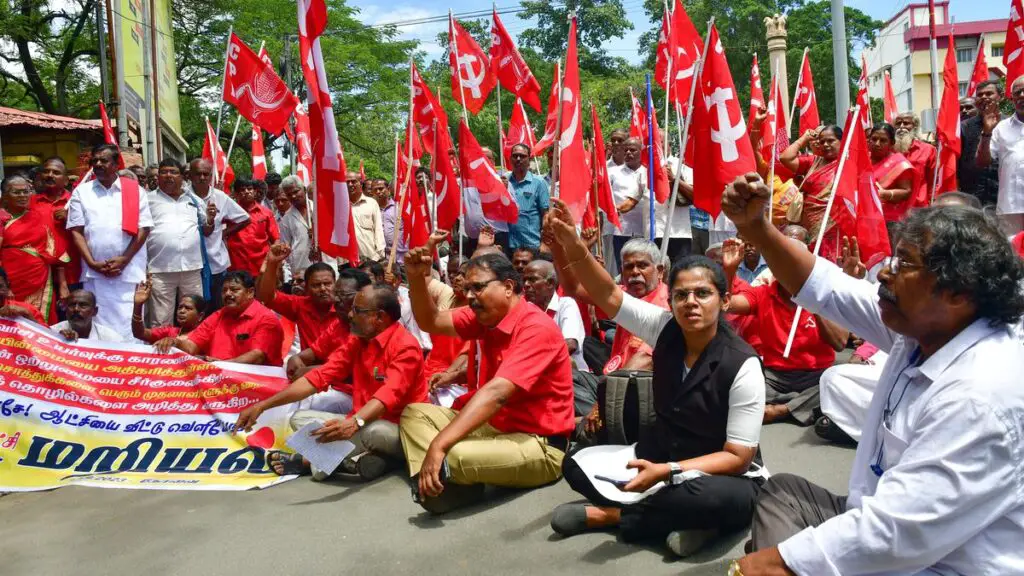Police Arrest Over 300 Communist Party Cadre in Coimbatore Protest Against Anti-People Policies of Central Government
The police arrested more than 300 cadre of Communist Party of India (CPI) in Coimbatore city on Tuesday when they staged a protest against the ‘anti-people’ policies of the Central government. The cadre called for the dismissal of the BJP government. The CPI has called for a three-day state-wide protest from September 12 against the BJP government in the Centre.
Rising Prices of Cooking Oil, Petrol, Diesel, and LPG Fuel Public Outrage
The protestors expressed their anger over the soaring prices of essential commodities. They claimed that cooking oil prices had tripled, while petrol and diesel prices had crossed ₹100 per liter. The cost of domestic LPG cylinders also skyrocketed to ₹1,240. The protesters emphasized that only in India, petroleum products attract a whopping 260% taxes.
As the Indian economy continues to face challenges due to the COVID-19 pandemic, the burden of rising prices is becoming increasingly difficult for the average citizen to bear. The Communist Party of India led the demonstration to demand better policies and relief measures to alleviate the financial strain on the people.
Protesters Demand Government Intervention
The CPI cadre demanded immediate government intervention to address the crisis. They emphasized the need for decisive action to control the escalating prices of basic necessities. The protesters argued that the government’s negligence in managing the economy has resulted in immense hardships for the common people.
Their demands include:
- Reducing taxes on petroleum products to provide relief to the citizens.
- Implementing price control measures to curb the spiraling prices of cooking oil, petrol, diesel, and LPG cylinders.
- Ensuring transparency in the price determination process to prevent profiteering.
The CPI cadre voiced their concerns about the unequal impact of such price hikes on vulnerable sections of society, including farmers, daily wage earners, and marginalized communities. They stressed that urgent measures are essential to protect the livelihoods of these groups.
The Impact of Rising Fuel and Cooking Oil Prices
The sudden surge in fuel and cooking oil prices has far-reaching consequences for various sectors of the economy:
Agriculture
Farmers heavily rely on diesel-powered machinery for agricultural activities. With diesel prices soaring, farming operations become more expensive. This can lead to increased production costs and reduced profits for farmers, ultimately affecting the agricultural sector’s overall productivity.
Transportation
The rise in fuel prices directly impacts transportation costs. As fuel expenses increase, the cost of transporting essential goods, including food and other commodities, also goes up. This, in turn, results in higher prices for consumers and adds to the inflationary pressures in the economy.
Household Budgets
For the average household, increased cooking oil and LPG prices add to the burden of managing daily expenses. As cooking oil prices triple, families face difficulties in affording essential cooking ingredients, impacting their food budgets. Moreover, the soaring cost of LPG cylinders further strains household finances.
The Need for Government Intervention
Given the widespread protests and public outcry, it is evident that immediate government intervention is crucial. The CPI’s demands reflect the people’s frustrations and the urgent need for relief measures. The government must take swift action to address the following:
Reducing Taxes on Petroleum Products
The exorbitant taxes levied on petroleum products in India contribute significantly to their high prices. By reducing these taxes, the government can provide substantial relief to the public and help alleviate the financial burden faced by citizens. Additionally, it would stimulate economic growth by boosting purchasing power.
Implementing Effective Price Control Measures
The government should explore implementing price control measures to curb the soaring prices of cooking oil, petrol, diesel, and LPG cylinders. This would prevent unscrupulous traders from exploiting the situation and ensure that these essential commodities remain affordable for all.
Transparency in Price Determination
There is a need for greater transparency in the price determination process of essential commodities. It is crucial to prevent unfair pricing practices and ensure that the benefits of reduced global prices are passed on to the consumers. A transparent system would instill trust among the public and minimize opportunities for price manipulation.
Conclusion
The protests led by the CPI in Coimbatore and the statewide demonstrations are a reflection of the growing discontentment among the masses regarding the high prices of cooking oil, petrol, diesel, and LPG cylinders. The government must address these concerns and take immediate action to ease the financial burden on the public. By reducing taxes, implementing price control measures, and ensuring transparency in price determination, the government can alleviate the hardships faced by the common people and restore faith in its governance.


